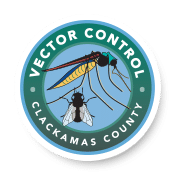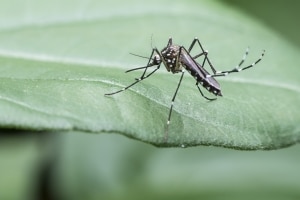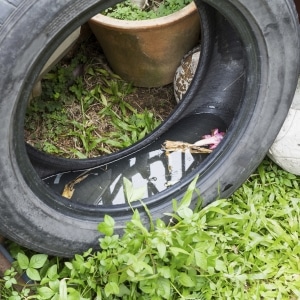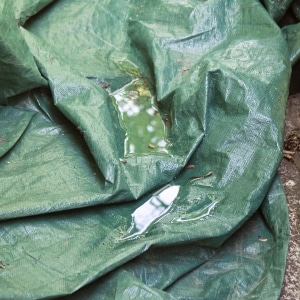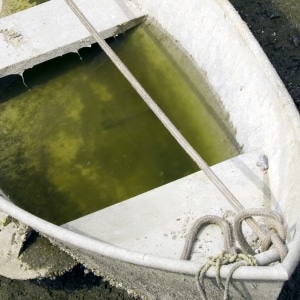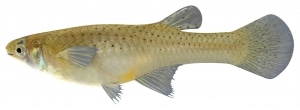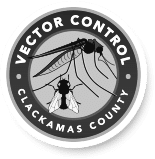Mosquito control is the process of actively reducing the number of mosquitoes. Comprehensive mosquito control can use one or more approaches that target different environments and life stages of the mosquito.
On-site assessment, monitoring and remediation: District staff maintains a survey of mosquito breeding sites in Clackamas County. This survey is updated regularly and each location is mapped and recorded. Each location is checked regularly and treated as necessary during the breeding season. Staff records the location of all known problem swimming pools in Clackamas County. A significant portion of the County mosquito problems originate from backyard pools.
Alternative to pesticide, biological control is an important part of our mosquito control program. Staff grows and distributes Gambusia affinis, a minnow that feeds on mosquito larvae, to any citizen of the county. Use of such fish reduces the amount of pesticide required to control mosquitoes.
There are four basic approaches to controlling mosquitoes: prevention, source reduction, larviciding and adulticiding. Preventing mosquitoes from breeding is the most desirable solution. Unfortunately, many human modifications of the environment such as ditches, retention ponds, and water management structures create mosquito breeding sites. Prevention requires working with planners to plan, construct, and maintain infrastructure without producing mosquito breeding habitats.
Source reduction is the elimination of water in which mosquitoes lay their eggs and in which the larvae develop or by containing water to eliminate areas for mosquitoes to lay their eggs. Source reduction is the second most effective method for controlling mosquitoes. Methods of source reduction involve eliminating containers that hold water and filling wet areas with soil. Larviciding is the use of materials to control immature stages of mosquitoes or prevent development of larvae from becoming adult mosquitoes. Larvicides are applied to waters that contain larvae and or pupae. Larvicides are effective in low concentrations and generally do not impact other organisms in the water or habitat. Every acre that is larvicided to prevent adult mosquitoes from emerging reduces the number of acres that must be treated with spray trucks. Clackamas County Vector Control has built a program focusing on larviciding to control mosquitoes.
Adulticiding is the last effort to control mosquitoes. Applied as directed, adulticide treatments have minimal effects on other insects. Clackamas County Vector Control is diligent in ensuring the proper size droplets and application rates are used. Adulticiding is done at night when adult mosquitoes are most active, which is also when most non-target insects like bees, dragonflies and butterflies are not as active.
FISH HELP PREVENT MOSQUITOES
“Mosquito fish” (Gambusia affinis), are important to our mosquito control program. They eat mosquito larvae as fast as they hatch from the eggs. Mosquito fish are furnished without charge for stocking ornamental ponds, unused or “out-of-order” swimming pools, and animal water troughs. They require no feeding and care is limited to protecting them from garden sprays and from chlorine or other chemicals used to clean the pond. Gambusia affinis help to eliminate the need for frequent spraying with mosquito products.
Facts About Mosquito Fish
Mosquito fish do not lay eggs, but rather give birth to well developed and very active young. These fish therefore require no special environment for depositing and hatching eggs. The earliest broods of the season are born in April and May, however, they breed throughout the summer with 50 to 100 young in a single brood. The young are approximately 1/4 inch in length when born and are ready to begin destroying mosquito larvae at once. Gambusia grow rapidly, reaching a maximum size of about three inches.
HIT MOSQUITOES WHERE THEY LIVE!
Beware of Dead Water in:
- Bird Baths, Buckets & Barrels
- Boats, Bilges & Covers
- Ponds & Water Features
- Concrete & Plastic Pools
- Gutters & Downspouts
- Neglected Hot Tubs & Pools
- Tires, Cans & Wheel Barrows
- Plant Pots & Saucers
- Leaking Hoses & Sprinklers
- Puddles, Troughs & Ditches
FIGHT THE BITES!
How to best avoid getting bitten by mosquitoes this spring, summer and fall? Stay inside or in screened-in areas during sunrise, sunset, and early evening. Cover up with long sleeves, long pants, socks, and closed shoes. Plug in a fan to keep you cool, mosquitoes don’t like moving air. Light citronella candles, tiki torches or even a fire pit where safe. Keep mosquitoes from breeding in your yard by dumping any stagnate water.
